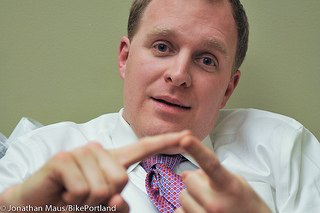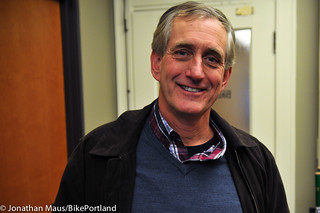“The Bureau of Transportation has been facing budget challenges for several years; how will you as mayor create a sustainable source of revenue or otherwise ensure that the bureau has the resources it needs over the long haul?”
—Question for mayoral candidates at recent Women’s Transportation Seminar luncheon
With the election just over a month away, it’s time to get serious about deciding who will be our next mayor. A Survey USA poll released by KATU News last week showed that 34 percent say they’ll vote for Charlie Hales, 29 percent are going for Jefferson Smith, and a whopping 37 percent are undecided.
That’s a lot of undecideds.
On September 11th, Hales and Smith were guests at the monthly luncheon of the Portland chapter of the Women’s Transportation Seminar, a group that promotes the advancement of women in the transportation industry. It wasn’t a back-and-forth debate, but the candidates got into some good detail on important policy issues. I wasn’t there, but I’ve obtained an audio recording of the event and want to share some of their answers with you.
One of the questions they were asked was about transportation funding. The question is below and it’s followed by a transcript of each candidate’s answer (which are pretty much verbatim, give or take a word or two):
Here’s Jefferson Smith’s answer:
“Everyone I’ve talked to who understands transportation knows we don’t have sufficient gas tax revenues to keep pace with current and anticipated transportation needs. That’s true of developers, of shippers, truckers, pedestrian advocates, and bicycle advocates. So, I think what we need is a coalition of folks, of maybe not so odd and maybe sometimes odd bedfellows, and then we have to figure out what we want to do. I do think there’s an opportunity with front page stories about how we’ve had to reduce maintenance, to have that conversation with the city and say, ‘Yeah, we have a lot of unimproved roads and we have to pay for that somehow — and by the way, it’s not bike lanes’ fault!
And I alone can say I did not hop onto The Oregonian’s basic frame of re-posting their article; which essentially said the reason we have so many potholes is because of bike lanes. What I know is that our entire bike network cost about $60 million and that’s a little over 1/3 of just planning, lobbying and consulting on the Columbia River Crossing project…
Now what kind of money might we look at? I think we [Charlie and I] agree on some little things — like an airport surcharge and then give free access to TriMet, using parking facilities with more variable prices so we’re using our resources a little more smartly — to things that are a little bigger like a utility fee. The good news politically, about a utility fee, is that everyone would pay for it and we could make the case that it would include bicyclists. Of course, a lot of the people that ride bicycles, I think 90% of them also pay car fees.
Ultimately what it will require is will. And there have been proposals for transportation funding in the past and they have been set aside. The next transportation commissioner, with the support of the next mayor — and I will probably will not be the next transportation commissioner even if I am elected mayor — will need the will and to build the political coalition necessary to pass whatever it is. And I bet the frame will be around basics and not merely about green streets, even if some of what we define as basics has significant overlap.”
And here’s how Charlie Hales answered:
“Let me tell you the sequence of how I’ll approach this set of questions. Because how you lead matters and this sequence will make sense to those of you that have worked on these kind of budget issues before. First, if I’m your mayor, I will assign all of the bureaus to myself for the first three months; something that Mayor Katz did effectively and it’s an effective antidote to the tendency of the commissioner form of government in Portland to drift into being five little mayors with their own agendas.
During that period, we will do really serious, heads-up strategic planning; not just among ourselves but with our partners at TriMet and Metro and Multnomah County, because so much that this city does is intertwined with what those other agencies do with their services. And we will prepare our budget at the city as a board of directors with all of us taking responsibility for the whole enterprise. It won’t be just the transportation commissioner’s problem that there’s not enough money to maintain the streets and build out the bikeway network. Then I’ll assign the bureaus to each of us to carry out that shared agenda.
Then, in transportation in particular, we need to both build the public’s confidence that we are taking care of the assets that we have, and communicate what we’re doing better. Because I can tell you from campaigning in the last year there are a lot of citizens out there who rightly or wrongly believe… wrongly actually [crowd laughs]… believe that the city is spending all of their money on bike lanes and that’s why the streets are going to hell. And we need to both make a larger commitment to maintenance itself and communicate what we’re doing to people first and clearly.
Regardless of how I assign the transportation bureau; again as your mayor, I know that will be my responsibility. You need to use the bully pulpit of mayor to advance that shared agenda.
Now, once we reach that point — clarity in our own budget, hopefully a better understanding in the community about how much money we have and what we’re doing with it — we’re going to need new resources. One is a street utility fee, another is a local gas tax focused on street repair and construction. Now we all know the gas tax is a dinosaur but it might work a little longer to catch us up and help us build out the 60 miles of un-built streets. At the regional or state level I would love to see us move to a VMT charge [vehicle miles traveled, read more about that here]. And of course as a regionalist, I’ll support a regional approach wherever possible — but we do have 60 miles of un-built streets, we’re not keeping up with our maintenance obligation, and we have a capital plan that needs a lot of help. So I believe and I expect that no matter what we do regionally we’ll still have to be willing to stick out our necks locally. And I will.”
——
What stands out to me about these answers is that it doesn’t seem as though Smith or Hales will keep the transportation bureau if they are elected. That’s actually very common. Mayor Sam Adams took on the bureau because he had it as a commissioner and he loves the job; but most local pundits agree that it’s simply too big (and thankless, and often controversial) for the Mayor to do. I’m looking forward to not having a mayor lead PBOT because I think it makes transportation even more politicized and potentially controversial. (This of course begs a discussion of which commissioner should oversee PBOT. I’ll save that for a separate post.)
Also noteworthy is how both candidates support a street utility fee. If they do take up that initiative, they’ll have a lot of groundwork already laid for them. Before he became mayor, Sam Adams attempted to implement a “street fee” via the “Safe Sound & Green Streets” effort he pushed through City Council in 2008. Adams’ effort ultimately unraveled and didn’t come to pass; but I’m sure the next mayor will dust off that effort and give it another go ’round.
What do you think? Did these answers help clarify your choice for mayor?
— For more coverage of the mayoral race, browse the BikePortland archives.



